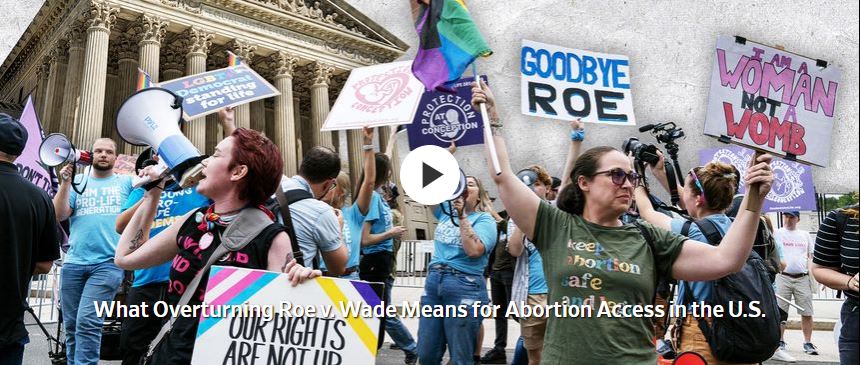The Supreme Court on Friday upheld abortion restrictions in Mississippi and eliminated the constitutional right to an abortion that was first established in the 1973 Roe v. Wade decision. The US Supreme Court has opened the door for individual states to ban or severely restrict the ability for pregnant women to get abortions. Here is a look at the court’s journey from establishing the right to abortion nearly 50 years ago to withdrawing it today.
In 1973, the court had ruled in Roe v Wade that pregnant people were entitled to an abortion during the first three months of their pregnancy, while allowing for legal restrictions and bans in the second and third trimester.
Now the court has overturned that earlier ruling, effectively making it possible for states to ban abortions earlier than 12 weeks.
Abortion will not automatically become illegal in the US – but individual states will now be allowed to decide if and how to allow abortions.
What is Roe v. Wade and why does it matter?
Roe v. Wade is a landmark Supreme Court case from 1973 that determined that the U.S. Constitution protects a woman’s right to an abortion before her fetus is viable, per Cornell Law School.
The case started with a woman named Norma McCorvey, who took on the legal pseudonym “Jane Roe.” McCorvey became pregnant in 1969 with her third child and wanted an abortion. But she lived in Texas, where abortions were illegal except in rare circumstances.
The court ultimately decided that during the first trimester, the decision to terminate a pregnancy was a woman’s choice on the basis that it constituted a woman’s “right to privacy.” And as such, it was unconstitutional to ban women’s access to abortion in individual states.
With this decision from the Supreme Court, states could still “regulate,” but not outlaw abortions in the interest of the mother’s health. Beyond the first trimester, the court ruled that states could regulate or outlaw abortions except when necessary to preserve the life or health of the mother.
With Roe v. Wade overturned, the Supreme Court now puts the decision back into the states’ hands. More on that in a second.

Why was Roe v. Wade overturned?
The Roe decision has been repeatedly challenged for nearly a half-century, but the current conservative makeup of the Supreme Court made it more likely that the case would actually be overturned this year.
Last year, the Supreme Court agreed to hear a challenge to Mississippi’s 15-week abortion ban with the Dobbs case, which also required the court to re-analyze the decision in Roe v. Wade, CNN explains. This decision ultimately affects the legality of abortion in the U.S. and now leaves it up to states to decide if and when abortions are legal within state boundaries.
“The challenge to Mississippi’s law gave the Court an opportunity to reverse Roe,” says Mary Ziegler, a professor of law at Florida State University, and author of Abortion and the Law in America: Roe v. Wade to the Present. “There would be any number of other options to reverse Roe. This was just the one that came to the Court the most quickly.”
At the same time, some states have put policies in place that increases abortion access for constituents, while others have made things more restrictive.
Overall, 26 states, or more than half of the country, have laws that could restrict access to abortion now that Roe is overturned. And just 16 plus the District of Columbia have laws in place to protect that right, despite Roe being overturned.
Earlier in May, Ziegler explained that she, “would expect about half of the states to criminalize all abortions. That will happen very quickly—in a matter of weeks or months.
Which states will ban abortion or have abortion trigger laws in place?
Many states have passed “trigger laws” that come into effect upon Roe v Wade being overturned. Others have left old laws on the books that banned abortion prior to 1973 – they could now go back into force.
Over the past decade, several states have also tried to pass laws making abortion illegal, except in a few circumstances such as if the pregnant woman’s life is at risk. Some of those laws were struck down by lower courts, as they appeared to violate Roe v Wade. But now they will likely come back into force.
In total, more than 20 states are making moves to limit access to abortion, according to Guttmacher. Some states intend to ban abortion from the moment of conception, while others are introducing bans at six or more weeks.
All states allow abortion to save the life of the mother, while some will also allow exceptions to their ban for cases of rape or incest.
Most have said they will not prosecute women for trying to end their pregnancy, reserving criminal penalties for abortion providers and others who try and help people get abortions.
Thirteen states have passed so-called “trigger laws” that will almost immediately ban abortion now that Roe v. Wade is overturned, according to the Guttmacher Institute and CNN. Those states include:
- Arkansas
- Idaho
- Kentucky
- Louisiana
- Mississippi
- Missouri
- North Dakota
- Oklahoma
- South Dakota
- Tennessee
- Texas
- Utah
- Wyoming
At least 9 states have pre-Roe abortion bans that have been going unenforced because they were previously “unconstitutional.”
This is no longer the case.
These states already had restrictions in place, but Roe v. Wade rendered them unconstitutional, the Guttmacher Institute explains. The restrictions had been blocked by courts, but now they could be brought back under a court order since Roe has been overturned.
- Alabama
- Arizona
- Arkansas
- Michigan
- Mississippi
- Oklahoma
- Texas
- West Virginia
- Wisconsin
The Supreme Court also has not suspended Texas’ six-week abortion ban, which offers a $10,000 reward to anyone who reports people suspected of seeking, obtaining, helping with, or performing abortions.
16 states and D.C. are mostly unaffected.
Sixteen states have put their own laws in place to protect the right to end a pregnancy, and some lawmakers from these states have also vowed to protect abortion rights.
“Our daughters, sisters, mothers, and grandmothers will not be silenced. The world is about to hear their fury,” California Governor Gavin Newsom said on Twitter. “California will not sit back. We are going to fight like hell.”
The states mostly unaffected by the decision include:
- California
- Colorado
- Connecticut
- Delaware
- District of Columbia
- Hawaii
- Illinois
- Maine
- Maryland
- Massachusetts
- Nevada
- New Jersey
- New York
- Oregon
- Rhode Island
- Vermont
- Washington
How would people access abortions in these states if a ban goes into effect?
If someone wants to obtain an abortion and lives in a state where they’re illegal or very restricted, they will still have options. But abortion providers will be harder to find and more expensive.
Some options include traveling to a state where abortions are still legal or ordering pills from outside the country, says Stephanie Toti, senior counsel, and project director at The Lawyering Project. “Folks who have the resources to travel will be forced to travel out of state at great expense and inconvenience,” she says. “But people who don’t have the option to travel will be forced to carry pregnancies to term.”

Ordering medication online is tricky, Toti says. “Those services exist and will continue to exist but, in any state that bans abortion, those services will also be illegal,” she says. “Folks trying to access abortion in that way will face potential criminal prosecution.”
Clinics in states neighboring other states with abortion bans will also likely see greater demand and limited capacity to meet the needs of those seeking help, according to The New York Times.
“In the short term, each state will decide its own policies,” Ziegler says. “But there will be a push to criminalize abortion nationwide through the Supreme Court or through Congress.”
Is Plan B banned anywhere?
With all this turmoil surrounding abortion, some people have also been confused about whether Plan B (an emergency contraception pill), similar morning-after pills, and even IUDs will also now be banned. The short answer? Not yet.
While no states have officially banned morning-after pills at this time, some lawmakers are considering putting bans in place.
For instance, in Missouri, a trigger law will likely restrict Plan B and IUDs. And in Idaho, a lawmaker said he was interested in holding hearings regarding laws that would ban emergency contraception, according to the Idaho Statesman.







